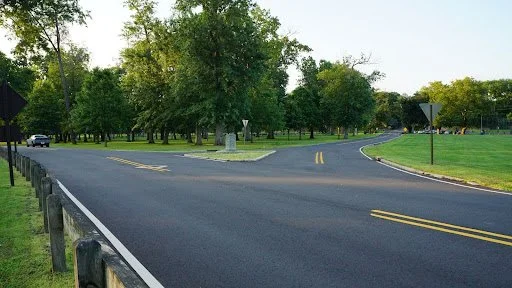An afternoon at Johnson Park
This is the first installment from the 2025 Citizen Journalism class: a photo essay by Shriaditi Kancherla titled “An afternoon at Johnson Park”. In this series, Kancherla captures both the activity and the serenity of the park.
Paved roads in Johnson Park enable visitors to drive or bike to different parts of the park on July 23, 2025.
Piscataway, NJ - Johnson Park lands at the crossroads of urban sprawl, where populated towns Piscataway, Highland Park, and New Brunswick fade into acres of trees and the scent of grass.
As I pull into Johnson Park, just a twelve minute drive from my house, the noise of traffic begins to soften, and is replaced with the laughter of children from a nearby playground. To my right, I see a wooden viewing deck that gives an outlook to the Raritan River. A young man throws his net into the water. To my left, a couple walks together, enjoying the glow of the setting sun. I step out of my car, and let the light breeze blow a leaf to my shoes. A little girl smiles at me, pointing at the leaf, and then quickly runs back to her parents.
Johnson Park is more than a 478 acre piece of land, it is a space designed for community engagement. I see my little brother make a new friend at the park, young people meeting up to run and strangers cheering for players during a recreational softball game. I smell the charcoal and spices from a family grilling fish on a park grill. Parks and their various amenities, whether that be recreational grills or paved trails, provide spaces for people to escape the buzz of modern, urban life, and enjoy the stillness of nature with the presence of others.
Public parks serve as “third places” in capitalist America, creating room for spontaneous moments of humanity in a fast-paced world. Coined by sociologist Ray Oldenburg, third places serve as accessible and affordable spaces for individuals to socialize or decompress.
Third places are meant to separate relaxation and community engagement from home and work. In the past, common third places included community centers, bars, arcades, coffee shops, malls, and public parks. Yet, over time, malls have become desolate as people shop online, popular coffee shops like Starbucks require purchase of expensive drinks or pastries to utilize seating spaces, and more people work remotely, blurring the lines between home and work, and ultimately reducing the use for third places for after-work decompression.
Post-pandemic, many use social media as ways to interact, and avoid the now unaffordable prices in malls, bars, and arcades, which have further led to the decline of such spaces. However, with the decline of third places, Americans report spending less time with their friends, and are experiencing a loneliness epidemic.
Without price tags, demanding appointments, or the daily stressors, parks are a shared space for everyone, regardless of background or income, which makes them worth protecting and celebrating. Especially to those in poverty, which make up substantial populations in Johnson Park’s surrounding municipalities such as Piscataway, Highland Park, and New Brunswick (those in poverty make up 5.5%, 9.2%, and 31.6% of the population, respectively).
A 25-minute drive for much of the county, Johnson Park provides a space for sporting with friends after long days of work, areas for working mothers and their children to stroll, and opportunities for young people to interact with nature.
Whether you’re walking your dog alone, having a picnic with your friends, or just viewing the sunset, Johnson Park offers a place to just exist.
As I photograph Johnson Park, I try to capture the candid nature of individuals: couples walking into the distance, friends smiling and laughing, and cars pulling up into a parking lot— pictures of just people existing.
Liz, an Edison middle school teacher, watches her softball team from the sidelines before going up to bat on July 23, 2025. Liz plays for Dynamic Earth, an 18+ women’s Highland Park Recreational Softball team, during the summer.
“I know that especially during the pandemic, community engagement was limited,” Liz said. As a working mother, it’s great that I can still pursue recreational hobbies and connect with others.
The water bottles and equipment of Dynamic Earth, a Highland Park Recreational Softball team, line the benches of a Johnson Park softball field on July 23, 2025. Johnson Park has two softball fields and one baseball field, which can be used for recreational games.
Nico (pictured left), age 5, and Shivansh, age 10 (pictured right) get ready to go down a slide in one of the three playgrounds in Johnson Park on July 23, 2025. The two children became friends after meeting each other today at the park. “Everytime I come to the park with Nico, he manages to meet someone new,” said Andrea, Nico’s mother, “I’m glad he gets to develop friendships and have some fun.”
Ferns can be found along the Raritan River in Johnson Park on July 23, 2025. Johnson Park is located along the Raritan River, and has various viewing decks that allow people to view and access the river.
Samantha, a member of the Dynamic Earth softball team, runs to third base during a game on July 23, 2025. “Many of the women on our team are working mothers or over 60,” Samantha said. “This team provides the space for them to meet others and involve themselves in the community.”
Jose, a New Brunswick resident, hangs a net into the Raritan River in Johnson Park on July 23, 2025. Jose enjoys recreational fishing, which is allowed at Johnson Park.
Vijay and Kruti, residents of Edison, hold hands and walk together in Johnson Park on July 23, 2025. “We enjoy coming here, especially after work. It’s great to end our evenings watching the sunset,” said Kruti.








